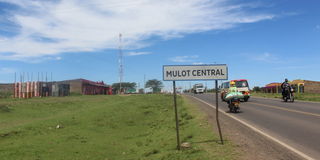
A busy tarmac road leading to notorious cybercrime hotspot Mulot Central in Bomet County in April 2021.
What began as sporadic incidents of mobile phone SIM swapping fraud in Mulot town, which straddles Bomet and Narok counties, has evolved into an elaborate multi-million-shilling cybercrime operation where fraudsters are trained at a fee.
Over the past 15 years, this criminal enterprise has turned Mulot into Kenya’s unlikely hub of digital fraud, the racket drawing national attention and frustrating law enforcement agencies as the allure of quick riches sees students drop out of schools and colleges.
The fraud involves scammers stealing subscribers’ registration details to illegally access victims’ mobile wallets to steal cash and take loans.
“It takes time before the owner of the mobile telephone line gets to know as he/she unknowingly goes off air. When the line is reinstated, they realise that the M-Pesa account has been emptied and a maximum loan processed from the online lending apps,” a police officer conversant with the fraud said.
Victims also receive calls purporting to be from banks where they hold accounts asking that they upgrade their security details. In the course of the conversation, the fraudsters obtain personal information, including passwords, that they use to access the bank accounts of their victims to withdraw the money.
Leadership structure
A report by one of the telecommunication firms has revealed the sophistication of the criminal enterprise, complete with a leadership structure, recruitment drives targeting students and training modules for fraudsters at a fee.
According to the survey by the telco, the criminal enterprise has “leadership structures and assigned responsibilities, with swappers being recruited from primary schools”.
So lucrative is the crime that recruits are paying between Sh10,000 and Sh40,000 for the training in fraud techniques, with some parents even encouraging their children to drop out of school to join the scamming trade.
“Training of swappers is at an average of Sh15,000. Some parents are opting to pull their children out of school to be trained on how to be swappers,” the report added.
An investigation by the Nation found that the fraud has evolved in the last three years with the rise of agents, bosses at the apex of the organised criminal network and sharing of the loot up the chain.
Erick, a known scammer in Mulot, said the number of scammers has increased in the last three years as a result of recruitment of “agents” who do the legwork for the “seniors” in the trade.
“Previously, our people ran M-Pesa outlets across the region, from where the registration details of the victims would be gleaned. But that has changed with the crackdown by security agencies that almost ran us out of business,” he stated.
“As a result, we devised a method to spread the risks and widen the net by recruiting people, some of whom are technology savvy, to beat the technology deployed by telcos in the country. It is a risky undertaking, but it is working in the interim,” he added.
The training of recruits, which is conducted in secret locations including houses belonging to the scammers, takes weeks for the learners to master the techniques.

A section of shops at Mulot Central trading centre which has the highest concentration of mobile phone money transfer fraudsters.
“The money obtained by the recruits in the course of the fraud is channelled through their team leaders to particular registered lines and bank accounts, after which it is withdrawn from different ATMs, authorised bank agents and M-Pesa outlets,” Erick explained.
Rogue M-Pesa agents
Some rogue M-Pesa agents collude with the scammers who are “out in the field” to withdraw the ill-gotten cash through their outlets. The recruits benefit from a percentage of the money they scam victims.
“It might interest you to know that some of the members of the county assemblies in the region are scammers and are at the apex of the organisation. Some have previous criminal records having been arrested but let go for lack of evidence,” another lead scammer claimed.
Peter, a university student, said in an interview on Wednesday in Rongena, Narok, that he diverted some of his tuition fees to pay for the fraud training.
“I used the second-year semester one fees to pay for training and I have been independent since then,” said the 24-year-old. “I do not depend on my parents for pocket money and fees in college,” added the student who claimed he had bought a car. He said his parents knew the money was proceeds of crime, but they do not mind.
The student claimed some police officers demand protection money from them.
Irine dropped out of secondary school last year after her boyfriend, a college dropout, recruited her into the underworld of cybercrime. The young and shy girl has been transformed into a daring scammer with an eye for fine things in life. She has developed a liking for rings and bracelets, caps and stylish hairdos and trendy outfits.
Despite the access to huge sums of stolen cash, the scammers rarely own motor vehicles, save for the “seniors” who drive around in Toyota Probox. Majority travel around in groups using leased motorcycles.
The fraud is synonymous with three trading centres—Mulot Central, Mulot Olomirani in Narok West Constituency and Mulot Sunset in Bomet County —all of which are separated by Amalo River, the natural boundary between Bomet and Narok counties.
But due to a frequent crackdown by detectives, the scammers have moved to other regions including Kajiado, Kiambu, Nakuru, Uasin Gishu, Baringo and Nairobi counties.
Chebunyo, Sigor, Olbutyo and Siongiroi in Chepalungu Constituency, Mulot, Kipreres and Longisa in Bomet East, Mulot, Sogoo, Rongena and Kipturkut in Narok South and Narok West constituencies, and Kuronguri and Kapsasian in Emurrua Dikirr constituency are some of the key areas of operation for scammers in the region.
The scammers are popular and lead a flashy lifestyle. They dress in particular rubber and sports shoes, jeans, sweaters and T-shirts. In clubs, they sit in groups, ordering expensive alcoholic drinks.

A section of shops at Mulot Central trading centre which has the highest concentration of mobile phone money transfer fraudsters.
The ill-gotten wealth from this crime has fuelled an economic transformation in the region, with the scammers flaunting their riches in social circles, buying land and constructing identical housing units. As a result, locals shield scammers from police scrutiny, viewing the trade as a viable economic activity.
Due to the nature of the fraud and lack of a paper trail, it is understood that detectives have abandoned most of the cases for lack of evidence.
Although detectives point to the sudden wealth of the youth who engage in spending sprees in social places, without concrete evidence to pin them down and secure convictions, they are helpless.
As a result, some of the police officers have also been recruited into the crime with some offering protection to the suspects who have spread their tentacles and operate with impunity.
Cybercrime investigation skills
“Law enforcers lack capacity in cybercrime investigation skills and tools while others have been threatened by the community and swim swap groups,” states the telco’s report.
Cases of university students murdered in unexplained circumstances have lately been on the rise in the region. Police officers said to be tired of chasing the scammers, have reportedly resorted to killing the suspects.
“We are cracking down on the mobile money fraudsters in the region and we have made several arrests in the recent past, thus breaking the criminal gangs,” Bomet County Commissioner Ahmed Omar said.
Dr Omar confirmed that the criminal gangs were recruiting youthful residents and that recent raids had revealed how deep the crime was in the local community.
In a bid to end the crime and put into good use the tech-savvy youth in the region, the national government initiated a multibillion software development factory in Mulot.
A groundbreaking ceremony for the project was conducted on July 29, 2022, by the then Information Communication Technology Authority chairperson Prof Fredrick Owino.
The Master Plan launched in 2022 is anchored on four pillars —digital infrastructure, digital government services, digital innovation, enterprises and digital business.
President William Ruto said on January 15, 2023, that his administration was partnering with global software companies to set up the facility that he said would cost Sh100 billion.
“I direct the county government of Bomet to quickly secure 100 acres for the project in Mulot of Bomet East constituency to set up the project that would turn the narrative of the region from that of a cybercrime centre to a software development hub of its own kind in Africa,” Dr Ruto said.
Governor Hillary Barchok has stated that his administration had bought 50 acres in the area for the establishment of the project as directed by the President.
Prof Barchok said the project would mark a major turnaround in the economy of the region as it would expose it to investments that would create employment opportunities and markets for goods and services.
However, Senator Hillary Sigei has accused Prof Barchok’s administration of dilly-dallying on the issue to the extent that the county risks losing an initial Sh400 million for the project.
“Governor Barchok has not handed over the title deed for the land to the national government to enable funding to be released. We risk losing the allocation as a county, in what would derail development in the region,” Mr Sigei said on Tuesday last week.











